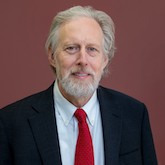Breadcrumb
The goal of the NextGen Precision Health & Ellis Fischel Cancer Center Science Seminar is to highlight transdisciplinary precision research taking place in the cancer field, provide opportunities for collaboration among researchers to build their own research efforts and promote clinical/researcher activity across the University of Missouri System and our partners.
For questions about this event, please reach out to Veronica Lemme.
Fighting HPV Infections; Developing Oral Cancer Diagnostics
Speaker: James Bashkin, D.Phil., Professor, Department of Chemistry & Biochemistry, University of Missouri-St. Louis; Chair-elect, local American Chemical Society 2023; Ellis Fischel Cancer Center; Associate Member, Siteman Cancer Center
Date: July 20, 2023, 4:30-5:30 p.m.
Location: Roy Blunt NextGen Precision Health Building, Atkins Family Seminar Room
Description
Dr. Bashkin will describe work on anti-human papillomavirus agent discovery and mechanism of action and on new, planned research to study the pathology of head and neck cancer as it varies from the U.S. to South Africa to Belgium. The ultimate goal of the planned research is to find biomarkers for inexpensive early detection of head and neck cancer cases.
About the Speaker
Dr. Bashkin received his B.A. in chemistry from the University of California, Irvine, and his D.Phil. from Oxford, England. He was an NIH postdoctoral fellow at Harvard University before joining Monsanto Corporate Research. He spent time with both Washington University and then again Monsanto (later Pharmacia and Pfizer) before joining UMSL in 1999 where he is now a professor of chemistry and biochemistry. Dr. Bashkin serves as chair-elect for the St. Louis American Chemical Society Section, 2023-4. He received the St. Louis Section Award and American Chemical Society Roland Tibbets Award in 2006. In 1998, Dr. Bashkin received the President’s Green Chemistry Challenge Award and in 1994 was awarded the Thomas and Hochwalt Prize. Dr. Bashkin’s group’s research has recently been directed to the interface of chemistry and biology, in areas such as "chemical genomics” — the design of antiviral and anticancer agents and green chemistry. Much of this work involves the chemical synthesis and biochemical testing of sequence-specific DNA binding molecules designed to control gene expression. Their main goals are the invention of new chemical methods to treat and diagnose diseases and the invention of new chemical reactions to eliminate toxic waste and other undesirable features of traditional chemistry.